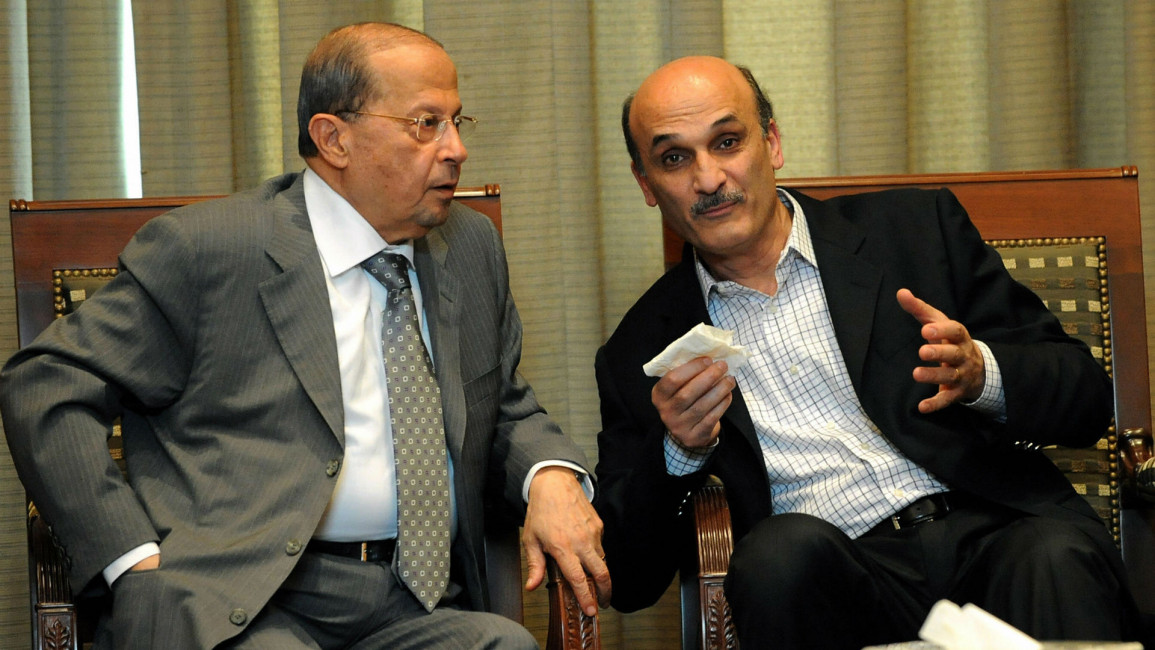Lebanon fails to elect president for 25th time
Lebanon fails to elect president for 25th time
Parliament has yet again failed to meet the quorum necessary to vote for the presidency, vacant for over a year, as fears grow for the future of the Lebanese state.
2 min read
Aoun (L) and Geagea (R) are rivals for the presidency [Getty]
Lebanon's parliament failed to secure a quorum to elect a president on Wednesday for the 25th time since its last president stepped down just over a year ago.
The parliament requires a quorum of two thirds of its members to be present for any presidential vote to be constitutional - but just 50 of 128 members turned up on Thursday.
The presidency has been vacant since Michel Suleiman stepped down at the end of his term on 25 May last year.
"The presidential palace is closed and there is fear that this [could] torpedo the republic altogether - parliament is paralyzed and the cabinet is at risk of exploding," Mohammad Choucair, president of the Union of Chambers of Commerce, Agriculture and Industry, told The Daily Star.
Parliament's inability to elect Suleiman's successor threatens to plunge the country into a political crisis.
Speaker Nabi Berri has set the date for the next attempt for 15 July.
The parliament is divided between the pro-Syria March 8 alliance, which holds 68 seats, and the anti-Syria March 14 alliance, with 60 seats.
Michel Aoun's Change and Reform bloc, Hizbollah and other lawmakers from the March 8 alliance are boycotting the vote, according to Naharnet, over their call for a consensus candidate.
Both blocs back rival candidates for the presidency, which under the constitution must be held by a Christian.
March 8 backs Michel Aoun, while March 14 backs Samir Geagea, who heads the Lebanese Forces. The two head the country's largest Christian political blocs.
Lebanon, a small state with a population of just over four million, currently hosts more than one million Syrian refugees, a huge burden on its economy.
The parliament requires a quorum of two thirds of its members to be present for any presidential vote to be constitutional - but just 50 of 128 members turned up on Thursday.
The presidency has been vacant since Michel Suleiman stepped down at the end of his term on 25 May last year.
"The presidential palace is closed and there is fear that this [could] torpedo the republic altogether - parliament is paralyzed and the cabinet is at risk of exploding," Mohammad Choucair, president of the Union of Chambers of Commerce, Agriculture and Industry, told The Daily Star.
Parliament's inability to elect Suleiman's successor threatens to plunge the country into a political crisis.
| The presidential palace is closed and there is fear that this could torpedo the republic altogether. - Mohammed Choucair |
The parliament is divided between the pro-Syria March 8 alliance, which holds 68 seats, and the anti-Syria March 14 alliance, with 60 seats.
Michel Aoun's Change and Reform bloc, Hizbollah and other lawmakers from the March 8 alliance are boycotting the vote, according to Naharnet, over their call for a consensus candidate.
Both blocs back rival candidates for the presidency, which under the constitution must be held by a Christian.
March 8 backs Michel Aoun, while March 14 backs Samir Geagea, who heads the Lebanese Forces. The two head the country's largest Christian political blocs.
Lebanon, a small state with a population of just over four million, currently hosts more than one million Syrian refugees, a huge burden on its economy.



